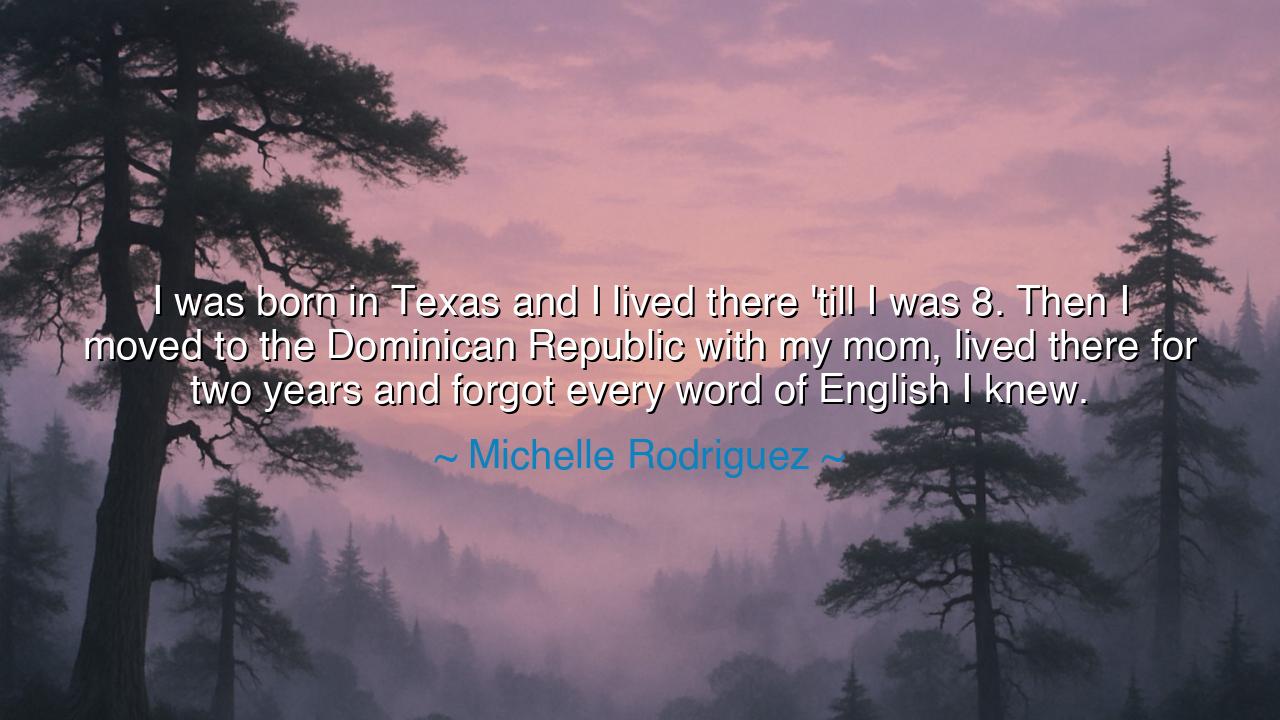
I was born in Texas and I lived there 'till I was 8. Then I moved
I was born in Texas and I lived there 'till I was 8. Then I moved to the Dominican Republic with my mom, lived there for two years and forgot every word of English I knew.






The words of Michelle Rodriguez, “I was born in Texas and I lived there 'till I was 8. Then I moved to the Dominican Republic with my mom, lived there for two years and forgot every word of English I knew,” speak to the power of place, language, and identity. They reveal the way childhood is shaped not by one land alone but by many, and how the roots of a person can stretch across cultures, shifting like waves, yet binding them to a wider human story. Her reflection is not merely about forgetting a language; it is about being remade by experience, about the way we carry within us more than one home, more than one voice.
The origin of this thought lies in her childhood journey between worlds. Born in Texas, Rodriguez first knew the rhythms of American life. But in moving to the Dominican Republic, her environment, her tongue, and her very identity were immersed in a new world. The mind of a child adapts swiftly—English faded, Spanish flourished. In those two years, she became a child of the Caribbean, reshaped by the sounds of her mother’s heritage. Yet in time, as she returned to English, she carried both voices within her. This experience forged in her a resilience and adaptability that would later mirror the fierce, transformative characters she portrayed on screen.
This truth is mirrored in the lives of countless wanderers of history. Consider Joseph, the Hebrew sold into Egypt, who learned the language of strangers and rose to power in a land not his own. Or think of Marcus Aurelius, who studied Greek philosophy though he was a Roman emperor, embracing wisdom born of another tongue. In each case, identity was not bound by one language or place, but by the ability to weave together the threads of many worlds. Rodriguez’s story echoes theirs: the forgetting of English was not a loss, but a transformation, a passage from one world to another.
There is also a profound sadness in her words—“forgot every word of English I knew.” For forgetting is a form of death, the temporary burial of a voice once spoken. To lose one’s first language, even for a season, is to lose part of oneself. And yet, this forgetting also carries within it rebirth. When the words of English returned to her, they did not come alone; they returned joined with the music of Spanish, giving her a richer voice, a deeper understanding of the human condition. From loss came renewal, from forgetting came expansion.
Her story also carries a lesson about the power of motherhood. She moved “with my mom,” and in those words lies the truth that a mother’s choices often shape the entire landscape of a child’s life. By following her mother, Rodriguez entered a new world, one that redefined her tongue and her sense of self. The guidance of parents, whether through deliberate choice or circumstance, has the power to alter the destiny of their children in ways no one can foresee.
The lesson here is this: identity is not fixed but fluid, shaped by language, culture, and experience. To live between worlds is not weakness but strength. Those who walk in more than one land, who speak in more than one tongue, carry within them a vision that is broader and a heart that is deeper. Forgetting is not the end; it is part of the process of becoming something greater than what one was before.
Practically, this means we should not fear the loss or change of identity when we enter new environments. Instead, we should embrace transformation, knowing that every culture, every language, every experience enriches the soul. Parents, too, must remember the weight of their decisions on their children—what seems a small move may one day define the breadth of their child’s wisdom and strength.
Thus, Michelle Rodriguez’s words, though spoken simply, carry ancient weight: to forget is to transform, and to live between worlds is to grow. In her story lies the reminder that human beings are not bound to one soil, one tongue, or one path. We are ever-changing, ever-becoming, shaped by the lands we walk and the voices we inherit. And in that becoming, we find the fullness of our humanity.






AAdministratorAdministrator
Welcome, honored guests. Please leave a comment, we will respond soon